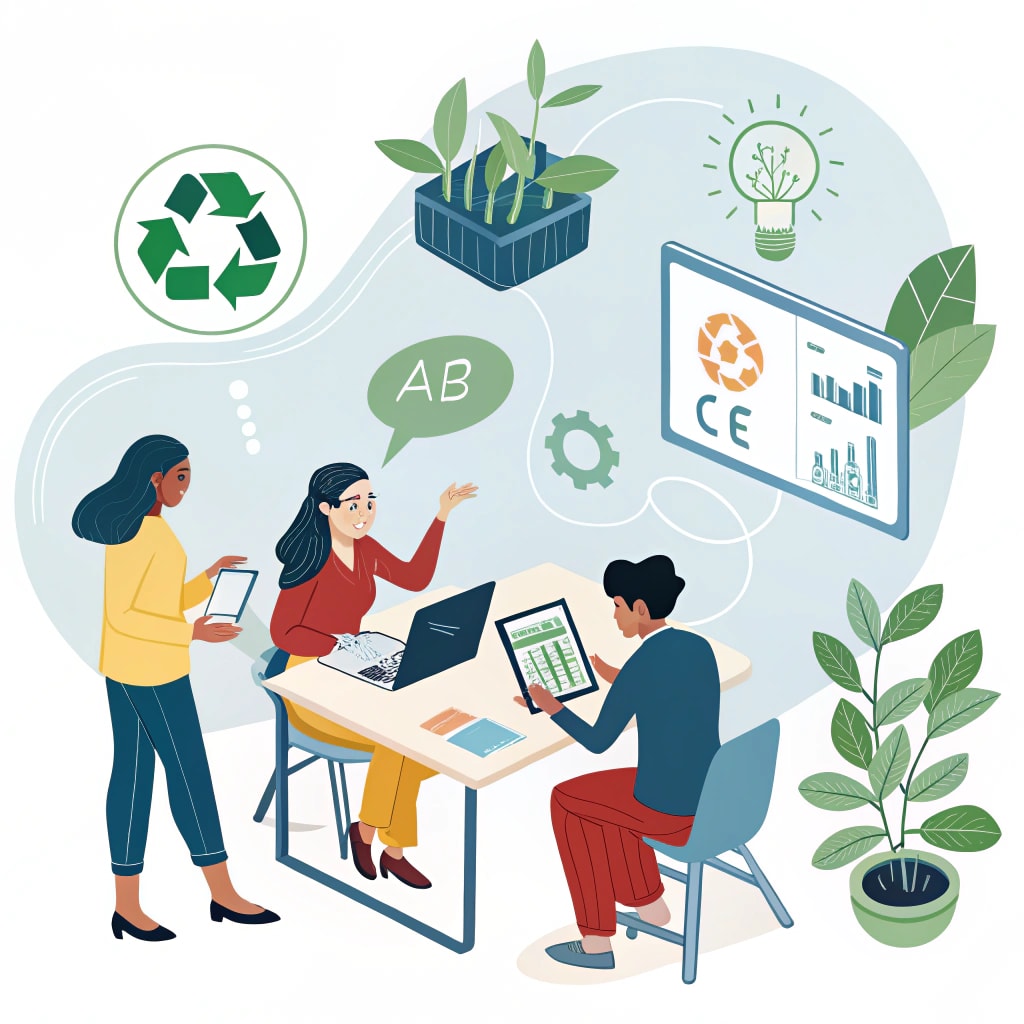In 2025, undergraduate business education is undergoing a sweeping transformation. Influenced by the uncertainties of climate change, the rise of artificial intelligence, and the ever-growing demands of global markets, today’s business schools are embracing a new paradigm. They are reshaping traditional curricula to equip students with AI literacy, sustainability insight, and global fluency—creating professionals who are not only savvy in spreadsheets but also socially conscious and globally minded.
Table of Contents

Integrating AI: Not Just Tools, But Strategy and Ethics
AI is no longer a niche add‑on; it’s rapidly becoming core to business education. Top programs like Wharton’s newly announced undergraduate concentration in Artificial Intelligence (coming fall 2025) integrate deep learning, machine learning, and ethics into one coherent path. Required courses such as “Foundations of Deep Learning” and “Big Data, Big Responsibilities” ensure students master both technical and ethical dimensions.
At American University, the newly created Institute for Applied Artificial Intelligence embeds AI throughout the business curriculum, training both undergraduate and graduate students to use AI in consumer research, marketing, financial analysis, and risk underwriting. Meanwhile, institutions like Symbiosis University in India have launched AI institutes to democratize access, encompassing interdisciplinary majors that merge AI with domains like healthcare, agriculture, and communications.
But integration is thoughtful and critical. Some educators remain cautious. Regardless of whether institutions embrace tools like ChatGPT or restrict them, educators are redesigning assignments to stress original thinking, avoiding over-reliance on generative AI and preserving deep learning.
Pushing Sustainability from Elective to Core
Sustainability has moved from elective status to the central pillar of undergraduate business programs. Leading schools now weave ESG (Environmental, Social & Governance) themes into core courses like finance, strategy, operations, and marketing. HBS mandates courses in corporate accountability; INSEAD offers electives on sustainable business models; and Yale, Kellogg, and Ross integrate sustainability across disciplines.
Experiential learning is becoming a hallmark of sustainability education. At MIT Sloan, undergraduates engage with NGOs, startups, and green firms to tackle real-world environmental projects. Cornell Johnson’s Centre for Sustainable Global Enterprise offers consulting and competitions that let students apply sustainability knowledge directly in business settings.
Universities are also pursuing global sustainability partnerships and emphasising impact. Across Europe, UNA Europa is launching a Joint Bachelor in Sustainability, coordinated across six institutions, giving students mobility and specialisation in tracks ranging from sustainable sciences to management and law.

Instilling Global and Cultural Competence
Business schools are cultivating the ability to operate across borders and across cultures. Symbiosis International’s global BBA, in partnership with Deakin University, provides a dual‑degree experience across three countries, designed explicitly to build cross‑cultural fluency and global strategy awareness.
Similarly, UNA Europa’s joint bachelor degrees enable seamless mobility across universities in Europe, strengthening academic collaboration and intercultural learning in fields including business & economics.
Beyond formal partnerships, institutions equip students with language training, international internships, study-abroad opportunities, and collaborative global case studies. These immersive experiences build real-world skills in intercultural communication and help prepare future leaders for global impact.
Human Skills & Adaptability: Preparing for the Unknown
AI and sustainability are vital, but business education also emphasises human-centric, adaptable skills that machines can’t replicate. Educators like Kingston University’s vice‑chancellor stress skills such as creativity, lateral thinking, adaptability, and resilience, arguing that these competencies are key to thriving in a digital‑first world.
In response, institutions are embedding soft skills training—emotional intelligence, team communication, leadership—in core curricula. Group projects, cross-disciplinary collaboration, and leadership modules are common across modern undergraduate business degrees.
Experiential Learning: Simulations, Casework, and Beyond
The shift to experiential learning—virtual simulations, real-company projects, ethical games, and hackathons—is reshaping how undergraduates learn. At Leuphana University in Germany, business students now engage with an AI ethics serious game called CO‑BOLD, where they role-play quality assurance managers evaluating an AI banking assistant. The goal is to sharpen ethical reasoning and moral sensitivity—skills often underrepresented in classrooms.
Elsewhere, programs like those at Henley Business School involve real-time climate data and business simulations focused on “Climate Intelligence”, while IE University and ESSEC in Europe use VR and XR tools to create immersive, sustainable business case experiences.
Cross-disciplinary & Modular Learning: Flexibility Matters
Modern curricula are breaking traditional silos. Bologna-style and UNA Europa schemes let students craft majors and minors across fields like law, sustainability, economics, and AI, enhancing flexibility and interdisciplinarity.
Hybrid and modular learning is also gaining traction: institutions are pairing online components with in-person instruction, micro‑credentials, certificates, and modular up‑skilling courses either during or after UG studies.
Partnerships & Real‑World Business Alignment
Academic‑industry partnerships bring real-world insight into the classroom. Business schools collaborate with sustainability‑focused companies—such as Unilever, Patagonia, Google—or financial institutions to deliver internships, case challenges, and mentorship opportunities.
Similarly, AI initiatives are often launched in partnership with tech firms. At American University and Arizona State University, schools collaborate with industry leaders to give students hands‑on experiential exposure to AI tools and applications.
Case Studies in Action
- The Wharton School: Launching a formal AI concentration for undergraduates and refining its MBA major to blend deep learning, ethics, and practical AI deployment.
- American University: Establishing the Institute for Applied AI to weave AI skill-building into marketing, finance, and operations education.
- Symbiosis International University: Launching both a Global BBA with Deakin and a multi-disciplinary AI institute to democratize AI education in India.
- St. Xavier’s College (Kolkata, India): Introducing undergraduate modules in AI in business, data analytics, ERP, business intelligence, and even wetlands conservation—infused with ethics, creativity, and blended learning frameworks.
The Modern Graduate: A Tri‑Vector Competency Profile
Today’s forward‑thinking business graduates emerge with a three‑pronged competency mix:
- AI Capability – Fluent in data analytics, machine learning, generative tools, and ethical oversight.
- Sustainability Awareness – Skilled in ESG evaluation, sustainable strategy, and impact leadership.
- Global Fluency – Culturally agile with intercultural communication, global strategy, and experiential international exposure.
These graduates are adaptive, ethically minded, and equipped to lead across borders and industries.
Why This Matters: Students, Employers, and Societies Win
- For students, curricula built around AI, sustainability, and global skills align with growing industry demand and long‑term relevance. They gain strategic, ethical, and technical insight from day one.
- For employers, these graduates offer deeper value—able to leverage AI tools responsibly, navigate international markets, and champion ESG priorities across operations.
- For society, these shifts embed corporate responsibility into future decision-makers, yielding leaders who balance profit with purpose and global collaboration with sustainable impact.
Looking Ahead: What to Watch in 2025–2026
- More AI concentrations and institutes have been launched at the undergraduate level across global business schools.
- Expansion of dual‑degree and mobility programs, especially across Europe and Asia, offering interdisciplinary exposure and a sustainability focus.
- Widespread use of simulations and AI ethics games in pedagogy promotes moral reasoning and practical thinking.
- Faster adoption of VR/XR learning tools for immersive global and sustainability learning scenarios.
- Rising demand for micro‑credentials and lifelong learning modules, especially in AI, ESG, and global business.
Institutions that embrace this evolution will cultivate graduates able to adapt not only to future economies but to shape them.

Conclusion
Undergraduate business programs today are redefining what it means to study business. No longer bound to traditional functions, they are becoming dynamic platforms that integrate AI expertise, sustainability insight, and global fluency. This new model doesn’t just teach business—it prepares ethical, adaptable leaders ready to tackle the complexities of a rapidly changing world.
By embedding future‑ready skills into the core curriculum, institutions are not simply responding to trends—they’re charting a path toward purposeful, inclusive, and globally conscious leadership.
Join Our Social Media Channels:
WhatsApp: NaijaEyes
Facebook: NaijaEyes
Twitter: NaijaEyes
Instagram: NaijaEyes
TikTok: NaijaEyes
READ THE LATEST EDUCATION NEWS













![Tragic Incident: Fans of Seyi Vibez Die in Fatal Accident After Electrifying Lagos Concert [VIDEO] Seyi Vibez](https://naijaeyesblog.com/wp-content/uploads/2025/08/Seyi-Vibez-180x135.avif)


























